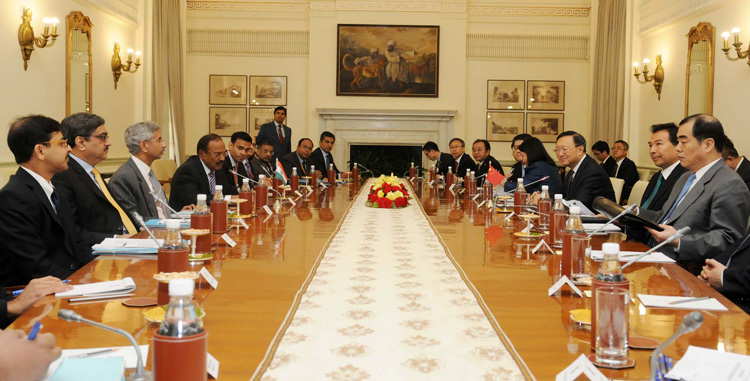INDIAN ARMED FORCES CHIEFS ON
OUR RELENTLESS AND FOCUSED PUBLISHING EFFORTS

SP Guide Publications puts forth a well compiled articulation of issues, pursuits and accomplishments of the Indian Army, over the years

I am confident that SP Guide Publications would continue to inform, inspire and influence.

My compliments to SP Guide Publications for informative and credible reportage on contemporary aerospace issues over the past six decades.
- Interim Defence Budget 2024-25 — An Analysis
- Union Defence budget 2024
- Indian Army: In quest of greater firepower and policy recommendations for gaps
- Indian Army Annual Press Conference 2024
- 6G will transform military-industrial applications
- Tata Boeing Aerospace Delivers 250 AH-64 Apache Fuselages, Manufactured in India
India-China Boundary Talks
 |
By Lt. General P.C. Katoch (Retd) Former Director General of Information Systems, Indian Army |

India and China have so far held 20 rounds of Special Representative-level talks to resolve the dispute over the 3,488-km long Line of Actual Control (LAC). The 20th round of negotiations between special representatives of India and China on the border issue was held last December; headed by National Security Advisor Ajit Doval and his Chinese counterpart Yang Jeichi, four months after the Doklam standoff. MEA had no elaborated the agenda for this albeit media speculated issues like the China-Pakistan Economic Corridor (CPEC) and China's opposition to India's membership to the Nuclear Suppliers Group (NSG) could be discussed. In November 2017, Chinese ambassador to India had publicly stated China will be willing to change the name of CPEC and create an alternate corridor through J&K, Nathu La Pass or Nepal to deal with Indian concerns. Prior to the 20th round of boundary talks, India had also raised the issue of the polluted waters of Siang River flowing into India during meeting of foreign ministers of both countries. What actually transpired during the 20th round of talks was not disclosed, nor the outcome. This has been standard practice in all the previous rounds of talks, the only announcements being that talks were 'fruitful' and 'progress' was made.
A major reason also is because China's stand keeps shifting their clams and have never handed over a marked map as to what their 'final' claims are. For example in 2005, the Chinese ambassador at New Delhi suddenly announced that entire Arunachal Pradesh, being 'South Tibet', was Chinese territory. Prior to 2005, Chinese claim in Arunachal Pradesh was restricted to the Tawang Plateau on religious ground; that Tibetans from China Occupied Tibet (COT) paid obeisance at the ancient Tawang Monastery. The 21st round of India-China boundary talks between NSA Ajit Doval and Chinese Foreign Minister Wang Yi are to be held in the near future. Ahead of these talks, BJP General Secretary Ram Madhav during a visit to Beijing made a statement, as reported by Indian media, that dispute over a "large segment" of the border with China has been resolved, barring the Western sector, and that negotiations were moving in the positive direction. Madhav also stated, "Most of the time those who are engaged in talks don't disclose day-to-day progress. They want to achieve certain milestone then only they will disclose." He also sounded positive about achieving a political consensus with the opposition parties if an agreement is reached between two countries. In Beijing, Madhav also reportedly sought Chinese investments in our northeast albeit China ironically has been objecting to Japanese investments in that region. If Madhav's statement were to be taken on face value, it implies that the dispute over the border along Arunachal Pradesh and in the Central Sector like in the Barahoti plains has been largely resolved, and that only Ladakh remains as the main bone of contention. How has this happened? Has China agreed to surrender its claims in Arunachal Pradesh in exchange to India surrendering Aksai Chin?
All this appears highly unlikely because the ground situation nowhere matches Madhav's statement. China does not recognize Ladakh and Arunachal Pradesh as part of India. As recent as in January 2018, China stated Beijing has never recognized existence of Arunachal Pradesh; responding to a question on January 4, 2018, about media reports that stated Chinese soldiers with construction machines had entered inside Arunachal Pradesh, Chinese Foreign Ministry spokesman Geng Shuang had said, "I need to point out that China's position on the China-India boundary issue is consistent and clear, and we have never recognized the so-called Arunachal Pradesh." It may also be recalled that during the Doklam standoff, China continued to intrude (termed transgressions) into the Barahoti plains both on foot and by helicopters. We have also seen some 30 odd PLA transgressions during May 2018, followed by a four-hour plus standoff in Sikkim with 50 PLA troops intruding two kms inside Indian Territory, and in July PLA posing as civilians pitched five tents in area of Demchok in Eastern Ladakh. In light of all this, Madhav's statement of dispute over large segment of India-China having been resolved is perhaps nothing beyond an election gimmick to impress voters. China is in no hurry to resolve the border dispute where its plans in all probability go beyond its present claims. More significantly, negotiations are favorable from a position of strength, and this context it is China that holds the aces, not India.





